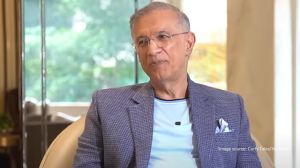Click here to join Express Pune WhatsApp channel and get a curated list of our stories
Pune Inc | Pune startup’s formula for ‘red gold’ comes with a greater vision
Shailesh Modak has created a way to marry the exotic appeal of saffron fields with an innovative practice that can help people grow the spice.
 It is here, amid one of Pune’s richest biodiversity zones, that Modak has created a way to marry the exotic appeal of saffron fields with an innovative agricultural practice that can help people grow the spice.
It is here, amid one of Pune’s richest biodiversity zones, that Modak has created a way to marry the exotic appeal of saffron fields with an innovative agricultural practice that can help people grow the spice.Growing up and well into adulthood, Shailesh Modak could not remember a time when he was not trying to get better at communication and public speaking.
Now, as Modak drives to work in the mornings, past a traffic-congested highway, up the NDA hill and into a deeply forested area, he feels the stress seep away. Through the trees, Modak catches the first glimpse of his startup—a shipping container, a cold storage area and a polyhouse.
It is here, amid one of Pune’s richest biodiversity zones, that Modak has created a way to marry the exotic appeal of saffron fields with an innovative agricultural practice that can help people grow the spice. A few years ago, he gave a Ted Talk on hydroponics and is, at present, in demand for lectures.
Modak’s formula, which he says “is not rocket science but science”, involves managing the essentials that plants require—CO2, nutrients, water and the environment, which includes humidity and temperature. Soil, crucially, is not mandatory. Since 2019, Modak has been growing a range of plants, from leafy vegetables to strawberries to microgreens, in shipping containers using hydroponics, a form of agriculture that does not use soil but aqueous solutions with nutrients. He decided on saffron after Covid. “I thought of doing something new,” he says.
According to IMARC Group, a market research firm, the size of India’s saffron market is projected to have a compounded annual growth rate of 13.6 per cent between 2024 and 2032. “The growing popularity of traditional Indian cuisine and the escalating demand for saffron as an essential ingredient, increasing incorporation of saffron into various beauty and cosmetics products, and augmenting demand for ethically sourced saffron represent some of the key factors driving the market,” reads a report on the company’s website.
 Modak, who was a software engineer before diverting into agriculture, has been a fighter since childhood. The youngest of three brothers in a family of educationists, he was the one who did not get to attend an English-medium school but studied in Marathi.
Modak, who was a software engineer before diverting into agriculture, has been a fighter since childhood. The youngest of three brothers in a family of educationists, he was the one who did not get to attend an English-medium school but studied in Marathi.
Known as “red gold”, saffron is primarily cultivated in Kashmir in India, with Pampore being the hub.
Modak adds that the demand for saffron in India is 100 tonnes, of which only 10-15 per cent is met by Kashmir. His vision is to “design a system by which an ordinary person can grow a lot of saffron crop”. He is close to cracking the code, having made strides since the first year when he would stress over the flowering of the plant. Now he is concerned about increasing the multiplication of saffron bulbs so that he does not have to depend on Kashmir. He has managed to increase the multiplication by 40 per cent.
“Once we can nail the multiplication process, we can make seeds available everywhere. If one lakh people can grow saffron, we can fulfil a good chunk of the market requirement,” he says.
Already, Modak is receiving inquiries from people who want to grow saffron in their homes, terraces and balconies. His saffron sells for Rs 499 per gram but the business model also includes selling the petals to the soap industry and ayurvedic practitioners, among others. Then there are the one thousand students who have been trained by him, generating a revenue through the educational vertical.
As Modak launches into passionate details of saffron growing, it is clear that it is his tenacity that keeps him going. He travels to Kashmir to understand the cultivation process and supplement that by studying literature on the spice on the internet.
Modak, who was a software engineer before diverting into agriculture, has been a fighter since childhood. The youngest of three brothers in a family of educationists, he was the one who did not get to attend an English-medium school but studied in Marathi.
“It was always in my mind that I could not express myself in the English language,” Modak says. He was a wiz in software “because it was an area where I didn’t have to talk, only work silently”.
Modak took classes in English but kept getting rejected at interviews, until one company took the bet on him. During the interview, he was asked to write on the board rather than speak. He was hired but paid by cheque for six months before the company became confident and sent him across the world on off-site assignments. Modak rose up the ranks but the question “when will I learn to talk?” hounded him.
Modak broke through, as his Ted Talk proves. Today, he is receiving emails from every country, from people who want him to share the knowledge of growing saffron anywhere. “We want to take our educational model to Africa and other countries,” he says.
Modak adds that he never drank milk earlier but, now, he has it with a sprinkling of saffron. If he has his way, more people will be drinking milk this way soon.
Click here to join Express Pune WhatsApp channel and get a curated list of our stories








